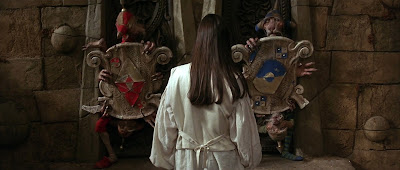And yet, when a group (collectively) fails to click with a
game the consequences can be severe.
Perhaps more insidiously, groups might spend years playing games that,
whilst enjoyable to some extent, don’t actually press their buttons.
This issue is compounded by the fact that within the group tastes may vary considerably, and that many people actually like a lot of different elements in different combinations. Consider the following list for example:
- Exploring ideas and concepts
- Exploring settings or environments
- Investigating mysteries and interacting with NPCs
- Battling and defeating foes
- Developing a story about the characters
- Acquiring new powers, expertise or items
- Interacting with the other players in character
- Developing innovative solutions to intractable problems
The chances are good that most players will enjoy all these
elements to some extent, but they probably also have several that they enjoy
over the others.
 Now consider the social inhibitions commonly associated with
gaming. The GM often runs the game they
want to play without necessarily having regard to the preferences of the
players, on the basis that they will invest more time into making the game
successful.
Now consider the social inhibitions commonly associated with
gaming. The GM often runs the game they
want to play without necessarily having regard to the preferences of the
players, on the basis that they will invest more time into making the game
successful.
Then there the myriad of complex relationships between
players – are they friends outside the game? Are some ‘tenured’ while others are relative
newcomers? Have some invested in specific
game books? Plus, the aforementioned possibility
that they may not actually have given a whole lot of thought to their actual
preferences, or simply enjoy the social activity irrespective of game.
So, how to reveal the preferences of players? Here are two suggestions:
Explicit question: contact the players individually and ask
them what kinds of activities they enjoy most; ideally as a hierarchy using a
list like the above, as it’s likely that people will enjoy all of those activities
to some extent, or in a particular context.
Observe and assess:
watch how your players respond to specific sessions containing different
mixes of the above elements. This will
likely also reveal the group dynamic to some extent and give you a good feeling
for where respective preferences sit around the table.
Suffice to say, that I’ve observed that the preferences of
the players in my group (collectively) are not actually what I would have
previously thought them to be, and since I’ve tried to find a game that better suits their
preferences, people have been having more fun.








No comments:
Post a Comment